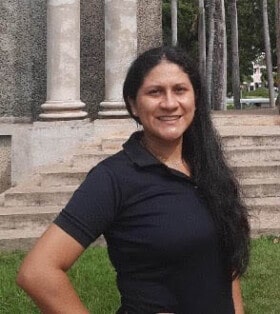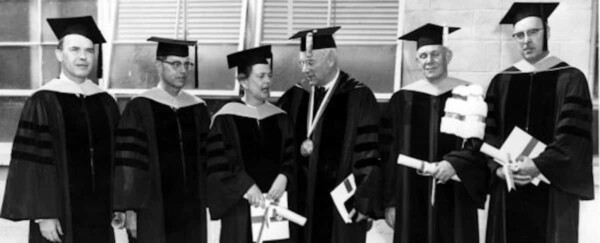Meet Yareni, Mechanical Engineering student at the University of Puerto Rico at Mayaguez
Yareni is a fifth year doctoral Mechanical Engineering student at the University of Puerto Rico at Mayaguez. PhD engineering degrees can take anywhere from 3 to 10 years depending on a student’s research. Yareni’s research focus is Bioengineering.
 My name is Yareni P. Lara-Rodríguez (Mexican), PhD Student in the Mechanical Engineering Department at the University of Puerto Rico at Mayagüez.
My name is Yareni P. Lara-Rodríguez (Mexican), PhD Student in the Mechanical Engineering Department at the University of Puerto Rico at Mayagüez.
During my life, I have been inspired by many women. Starting at home, it was my older sister, who was the first one out of my four sisters (and the only one) who went to the university (besides me). She studied Chemical Engineering. When I was 12 years old, I used to love taking her books. I would read them, and I would pretend that I was understanding what I was reading. Our parents influenced her to pursue an academic career. She influenced my decision to choose a career in Engineering.
At the age of 12, I remember my father always encouraged us to pursue our dreams and to prepare ourselves for the difficulties we would encounter. He knew that as women, we may come up against hurdles in our lives and in our careers. My parents always supported our education, and they helped us prepare for whatever life might bring us. They made me believe in myself. With their encouragement, I felt that I could earn a degree in engineering. It was my older sister who proved to me that it was possible.
Years later, I decided to pursue my bachelor’s degree in Manufacturing Engineering. I then finished my master’s degree in Mechanical Engineering. Now, I am in my fourth year of my PhD studies.
My big dream is to become a scientist that can contribute to the bioengineering field and health sciences. I hope to also inspire other women in the field. My current research work includes collagen production under external stimulus. Understanding how biological systems, like protein production, react to external stimuli is important to the health field. My research can help with the development of therapies that can be used to improve people’s lives.
I am passionate about learning more about biology and engineering every day. I am a curious, friendly, proactive, and compassionate person. I am someone who loves science, nature, and music. I am a resilient and hard-working person. I know that my qualities that make me who I am also make me an asset to any engineering team. I know that I can make a difference, and so can you!
Can you tell us how you first became interested in Mechanical Engineering?
When I was in high school, I was very interested in math. After I graduated and it was time to choose what I wanted to study, I reflected on how math can be used to solve real-life problems. I also had an interest in understanding how things work. I decided to pursue Mechanical Engineering. I knew that this discipline in engineering would lead me down a path where I could help others by solving problems and designing things that will improve their lives.
What did you know about Mechanical Engineering when you were a kid?
The only exposure to engineering I had was through my older sister. She went to school for Chemical Engineering. She brought home textbooks and I would often peek inside of them to try to learn from them. Inside of the textbooks were pictures of tanks, tubes, and formulas. I remember wondering what all those things were for. After my sister graduated, she worked in a textile manufacturing company, where she often donned her hard hat. I really looked up to her. Even though I was not able to understand her engineering field, I used to picture myself being like her. I imagined myself wearing a helmet and being able to understand all the amazing things in her textbooks.
What are some really cool things that Mechanical Engineers work on?
Mechanical Engineers work on all sorts of projects with teams of engineers from all sorts of disciplines. The key thing in common between all the different projects is what the Mechanical Engineer brings to the team: designing systems with moving parts.
I’m going to give you an example related to my research, because I think it’s really cool. Each of our bodies are like machines. We take care of our bodies by getting exercise and giving them fuel in the form of food. In a perfect world, our organs will help us with the load. They will process food, pump blood throughout our system, and our nerves will give us warning signs in case something goes wrong. Sometimes, things aren’t perfect, and we need a little help from technology to keep our bodies working.
One of the really cool things that Mechanical Engineers can do is help design a device that can be put inside of a human who has an organ that needs a little bit of help. Some devices can be implants that release medicine. Other devices control the pace of our heartbeats. Then there are devices related to my research, which imitate human organs. A common name for these devices is “Human Organs-on-Chips” or “Organ Chips.”
These devices can help doctors test for different diseases. They can help them determine how to treat a disease such as cancer. A future idea is that these devices can release medication in the form of something called nanoparticles. Nanoparticles are tiny particles of medicine, which can be told where they need to go inside of the body for treatment. The research of these devices has a long way to go because they are still being tested. Engineers continue to make changes to the design to make sure that the devices work well.
What challenges have you encountered as a woman studying Mechanical Engineering, and how have you overcome them?
I was one of the few women studying Mechanical Engineering in my university. One challenge for me was that I didn’t have much confidence in myself. I had to teach myself to believe that even though I was part of few women in the engineering classroom, I was capable. I pushed myself not to be shy, and to not be afraid of asking questions. I learned how to be confident and make friends with my classmates. With this practice, I found that I worked well with my peers and that I brought a lot of good ideas to my project team. Seeing myself as a person who has been given the same opportunities and classroom resources as my peers helped me find my academic strength.
Tell us about a time you failed. How did you move on from that?
Lots of people experience failure no matter what they study or what their job is. I have failed many times, but one failure that stands out to me was when I was working on my first project at my first job. I learned a lot in school and in training. Then I ran into a problem during the project, and I didn’t use all of my knowledge for the tool that was needed to solve it. I realized that I had made that mistake after the project ended. Reflecting on it now, I understand that I made that mistake because I was not confident in myself and I let that stop me from applying what I knew to solve the engineering problem I had. After that lesson, I became much more confident in the next projects. I took the initiative to try and use my knowledge. After making these changes, I became more satisfied with my work.
How might women and people from diverse backgrounds bring positive contributions to Mechanical Engineering?
I believe that cultural diversity is very important in the Mechanical Engineering field. When a team is made up of different people from different backgrounds, they bring their own perspective to the team. This can lead to better brainstorming and problem solving. A team member might suggest an idea that nobody else on the team would have come up with. Another important reason for diversity in engineering teams is inclusivity. If all the team members think the same and look the same, odds are, their design will be better for one group of people than for others.
Women especially can bring good ideas to their engineering groups. Their experiences and perspectives shape who they are and how they think. Sometimes, those experiences can help them be more creative. They may invent game-changing devices, or they may solve a problem that has not yet been solved because of their experiences.
Having diverse engineering teams can complement new or already existing engineering breakthroughs so that they benefit a culturally diverse society.
Can you describe a “day in your life” studying Mechanical Engineering and share what you like most about your program at the University of Puerto Rico?
A day in my life as a PhD engineering student is always busy, but never boring. When I go to the lab to do my research, I make sure to wear clothing that is safe to wear around samples. Of course, I wear a lab coat, as well. I work with biological samples called cellular cultures. I do most of my work on these samples in a room called a cell room.
Most days, I check on my cell cultures. Depending on what I have planned next for them, I might feed them, or I might get them ready for experiments. On days when I do experiments, I observe my samples through a tool called a microscope. Every day that I am in the lab, I learn something new about cell biology. That is an exciting part of my studies.
What do you love most about your school and its Mechanical Engineering Program?
What I love the most is the communication help available to students in my program. When we have an academic problem and we need help, the professors and office staff help us fix them. It really makes you feel valued as a student and as a researcher. I also enjoy the friendly environment in my school. Working with friendly people in my department helps keep me motivated, even when I have bad days.
Can you share any advice for our readers who might be considering going to school for Mechanical Engineering?
When you are studying engineering, it can sometimes feel overwhelming. People who find themselves feeling that way are not alone and all they need to do is reach out.
In my experience, the Mechanical Engineering field seems difficult because it involves mathematics. Even though Mechanical Engineers use a lot of math, what they need is much more than that. Mechanical Engineers need to be creative. They need to be passionate and dedicated. They also need to persevere. Finally, Mechanical Engineers need to practice, practice, and keep practicing. I have been able to do all of these things because I had the support of mentors, teachers, family, and friends. Find your support network. Believe in yourself, and you can be a Mechanical Engineer, too!
Author
-

Allison Osmanson is a Materials Science and Engineering PhD student at the University of Texas at Arlington. She holds a Master’s degree in Materials Science and Engineering from the University of North Texas and she earned her Bachelor’s degree in Materials Science and Engineering from Washington State University. She plans to graduate in December 2021, after which, she will be a Microelectronics Packaging Engineer at Texas Instruments in Dallas, Texas.






